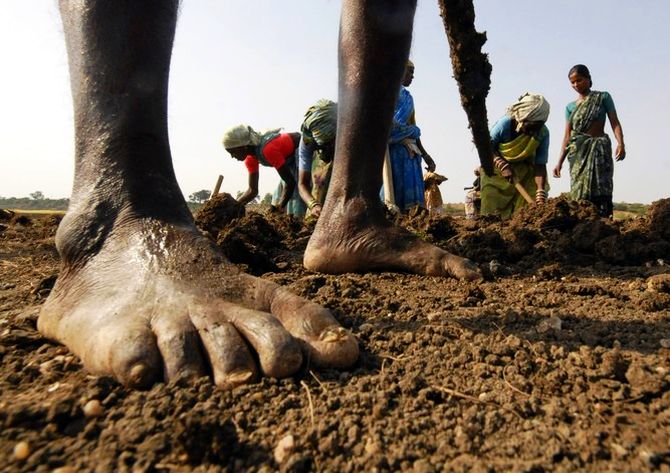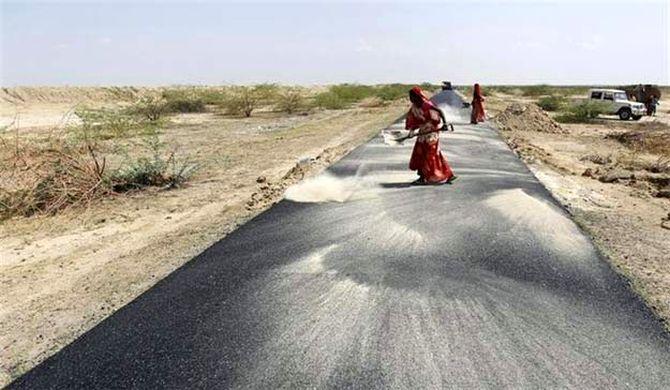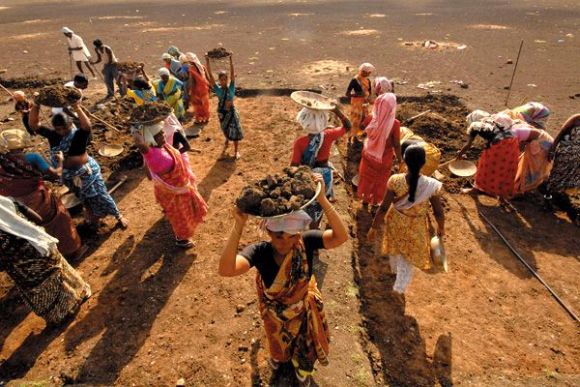Photographs: Paula Bronstein/Getty Images Sreelatha Menon in New Delhi
Involving NGOs in Mahatma Gandhi National Rural Employment Guarantee Scheme may extent its reach and help reduce corruption.
Will handing over the management of the Mahatma Gandhi National Rural Employment Guarantee Scheme (MGNREGS) to non-governmental organisations (NGOs) ensure the scheme works?
The rural development ministry seems to think so, at least in Naxal-hit areas.
Under the Mahatma Gandhi National Rural Employment Guarantee Act, NGOs are allowed to run the scheme, provided gram panchayats run half the works, in terms of costs.
Recently, the ministry handed over functioning of the scheme to NGOs in 184 blocks. If implemented across the country, this would surely reduce the role of the government machinery.
However, credible NGOs may make a difference, say analysts such as Ashwani Kumar of the Tata Institute of Social Sciences.
…
Can NGOs make govt's employment scheme a success?
Photographs: Reuters
As member of the Central Employment Guarantee Council, Kumar had prepared a report that said a consortium of NGOs should be entrusted with clusters of villages to ensure efficiency and minimising of foul play.
In Malkangiri district of Odisha, just two blocks implement the MGNREGS; the rest are kept out of bounds by Naxals, Kumar says, adding NGOs can help restore trust in these areas.
Though the handover of the scheme to NGOs was initially opposed by activists such as Aruna Roy and Jean Dreze, the ministry's recent decision hasn't been opposed by anyone so far.
The beneficiaries include not just NGOs, but also people's organisations under the National Rural Livelihood Mission (NRLM).
For instance, in Andhra Pradesh, the Society for Elimination of Rural Poverty, the NGO formed under the state's version of NRLM, is to run the scheme in selected blocks.
…
Can NGOs make govt's employment scheme a success?
Photographs: Reuters
Jeevika, another NGO set up by the government under NRLM, is to run the scheme in the blocks identified in Bihar. Pradan, another NGO, has been allocated blocks in many of the eight states where the model is being tried.
All India Congress Committee member and former member of the Central Employment Guarantee Council Sanjay Dikshit, however, questions the handover of the management of MGNREGS to NGOs, saying these have no accountability.
Block development officers and other government officials have much to lose if they are involved in any wrongdoing, but isn't the case with NGOs, he says.
While this initiative is limited to Naxal-affected districts, MGNREGS is facing hurdles in other districts, too.
Recently, the rural development ministry was accused of being hand-in-glove with the Uttar Pradesh government in allowing misappropriation of funds meant for this scheme. Dikshit accused the ministry of silently supporting diversion of these funds.
…
Can NGOs make govt's employment scheme a success?
Photographs: Reuters
He filed a complaint with the local police with documentary evidence of money being diverted towards other causes and attached 200 pages to show how even the media had a role in the diversion.
The politician-cum-activist compared the funds spent on advertisements with the publicity material that was published and said in most cases, the expenditure wasn't justified by the size of the advertisement. In many cases, there were no advertisements at all, he added.
Was this money used to silence the media, he asked.
Dikshit feels the Centre should have stopped funds for the scheme in Uttar Pradesh after the fact that most of the money was being diverted came to light.
Whether it is NGOs or the government that passes on the relief promised under MGNREGS to needy villagers, the primary stakeholder remains the job seeker, who, according to the latest statistics, is being provided only 28 days of work a year in one of the poorest states, Uttar Pradesh.






article